What is the Job Description for a Network Engineer? A Network Engineer is a very important person who works with computers. They design, set up, and maintain networks, which are systems that help computers and other devices talk to each other. Network engineers ensure that data (like emails, videos, and messages) can move smoothly and quickly across these systems. As the world becomes more connected, their job becomes even more important.
The Growing Demand for Network Engineers
More and more people need network engineers these days. This is because our world depends greatly on digital systems—like the internet and computer networks. Here are some reasons why network engineers are becoming more important:
- Cloud Computing is when you use the internet to store files or run programs, meaning you need strong and secure networks.
- Remote Working: Many people work from home now and use the internet to do their jobs, which requires good networks.
- Cybersecurity: Keeping data safe is very important, so network engineers also work to protect networks from hackers.
Because of all these things, there is a big need for skilled network engineers to help everything run smoothly and safely.
Key Responsibilities of a Network Engineer
Designing and Implementing Networks
- Planning Network Architecture: Network engineers create plans for how the network will be built. It’s like drawing a map that shows how computers will connect to each other.
- Selecting and Configuring Hardware and Software: They choose the right equipment like routers, switches, and firewalls. Then, they set everything up so that it works well together, making sure all the computer connections are strong and secure.
Maintaining and Troubleshooting Networks
- Monitoring Network Performance: Network engineers watch over the network to make sure it is fast and runs smoothly. It’s similar to watching roads to see if there is any traffic jam.
- Identifying and Resolving Network Issues: When problems happen, like when the internet is slow, they find out what is wrong and fix it. This keeps everything running without interruptions.
- Ensuring Network Security: They also protect the network from people who might try to break in and steal information. They use special tools to keep all the data safe and secure.
Collaborating with Other IT Professionals
- Working with Teammates: Network engineers work closely with other tech experts like system administrators and security analysts. They make sure the network does what the company needs.
- Why It Matters: This teamwork is very important. It helps everyone understand the technology better and keeps the network strong and healthy.
Network engineers do a lot to help set up, watch, and fix networks. This makes sure that everyone in the company can work without any problems. They also need to work well with others to keep everything running smoothly and keep the network safe. This is a big job, but it’s very important for keeping the company’s technology working right.
Qualifications and Skills
Education
- Field of Study: Network engineers often study computer science, information technology, or related areas in college.
- Purpose: These subjects help them learn how to build, operate, and fix networks, which are like the highways information travels on.
Certifications
- Types of Certifications: Important ones include CompTIA Network+, Cisco CCNA, and Cisco CCNP.
- Value: These certifications prove that a network engineer knows a lot about networks and can manage complex network tasks.
Essential Skills
- Technical Skills: Network engineers need to know a lot about how data moves through networks and how to keep networks safe from hackers. They use their tech skills to set up and fix network problems.
- Problem-Solving Skills: Sometimes, networks break or have problems. Network engineers need to think fast to figure out what’s wrong and how to fix it.
- Communication Skills: They need to be able to explain tricky network stuff in simple ways so that everyone understands. Whether they are talking to other tech people or bosses who don’t know much about technology, they need to make things clear.
- Teamwork: Network engineers often work with other tech people, like system admins and security experts. They need to work well with others to make sure the computer networks are the best they can be.
These are the main things you need to know and be good at if you want to be a network engineer. It’s a mix of learning a lot about technology in school, earning certificates, and having the right skills to work with technology and people.
Career Path and Industries
Entry-Level Positions
- Jobs: People just starting out might work as network technicians or in help desk support.
- Purpose: These jobs help them learn the basics and get ready for more complicated tasks later.
Mid-Level Positions
- Jobs: After gaining some experience, they can become network administrators or network specialists.
- Tasks: Here, they start to handle bigger and trickier problems in the network.
Senior-Level Positions
- Jobs: As they get really good at their jobs, they can become network architects or senior network engineers.
- Leadership: In these roles, they lead teams and work on big projects that help whole companies stay connected.
Industries Hiring Network Engineers
- Where They Work: Network engineers work in many places like technology companies, banks, hospitals, and even government offices.
- Why It’s Great: This job is cool because you can work in many different kinds of places. No matter where you go, everyone needs network engineers to help keep their computer networks running smoothly.
Tools and Technologies
Network Monitoring and Management Tools
- Tools Used: Network engineers use special software like SolarWinds, Nagios, and PRTG. These tools help them watch the network closely.
- Why They’re Important: Think of these tools as the doctors for the network. They check up on the network’s health and make sure it’s running well. If something starts to go wrong, these tools help the engineers fix it quickly.
Network Security Tools
- Types of Tools: To keep the network safe, engineers use tools like firewalls, intrusion detection systems, and vulnerability scanners.
- How They Help:
- Firewalls work like security guards at a gate. They check the data coming in and out and only let the safe data pass through.
- Intrusion detection systems are like alarm systems. If someone tries to sneak in or do something bad, these systems alert the engineers.
- Vulnerability scanners are like inspectors. They check the network for any weak spots, just like checking doors and windows to make sure they’re locked.
These tools are very important for protecting the network. They help make sure no one can steal or damage the information.
Salary and Compensation
Average Salary Ranges
Here’s what network engineers can expect to earn as they grow in their careers:
- Network Engineer: The starting salary for a network engineer is around $122,861 per year.
- Senior Network Engineer: After gaining more experience and moving up, they can make about $150,246 per year.
- Network Engineer IV: This is a more advanced level, and the pay can be about $151,442 per year.
How Much They Make
Network engineers generally earn a good salary, but several factors can affect how much:
- Experience: More experience usually means a higher salary. As network engineers grow in their careers, their pay increases.
- Location: In cities where it costs more to live, network engineers often earn more money.
- Industry: The type of company they work for can influence their salary. For example, tech companies might pay more than government agencies.
- Certifications: Earning specialized certifications can also lead to higher pay because these show high skill levels.
Additional Compensation
- Bonuses: Network engineers might receive bonuses for exceptional work performance.
- Stock Options: Some companies offer stock options, which means network engineers can own a part of the company. This can become very valuable.
- Profit-Sharing: If the company does really well financially, they might share some of the profits with their employees, including network engineers.
Challenges and Rewards
Challenges
- Staying Up-to-Date with Technology: Technology changes very fast, and network engineers need to keep learning new things. This is like trying to keep up with the newest video games or smartphones that come out.
- Dealing with Unexpected Outages and Security Threats: Sometimes, networks stop working suddenly or there are security problems. Network engineers have to fix these issues quickly to keep everything safe and running.
- Working Under Pressure: Network engineers often have to solve problems fast and make sure they do it right. This can be stressful, like having to finish a big school project in just one night.
Rewards
- Intellectual Stimulation: Network engineers always get to think about and solve interesting problems. It’s like playing a challenging puzzle game that keeps your brain sharp.
- Solving Complex Problems: They fix difficult issues that can be very important. Solving these problems can feel very rewarding, like figuring out a tough math problem.
- Contributing to a Company’s Success: By keeping the networks working well, network engineers help their company succeed. It’s a great feeling to know you helped your team win.
Being a network engineer has its tough moments, like needing to learn quickly and fix big problems under stress.
Sample Job Description for a Network Engineer
Here is the job description for a network engineer:
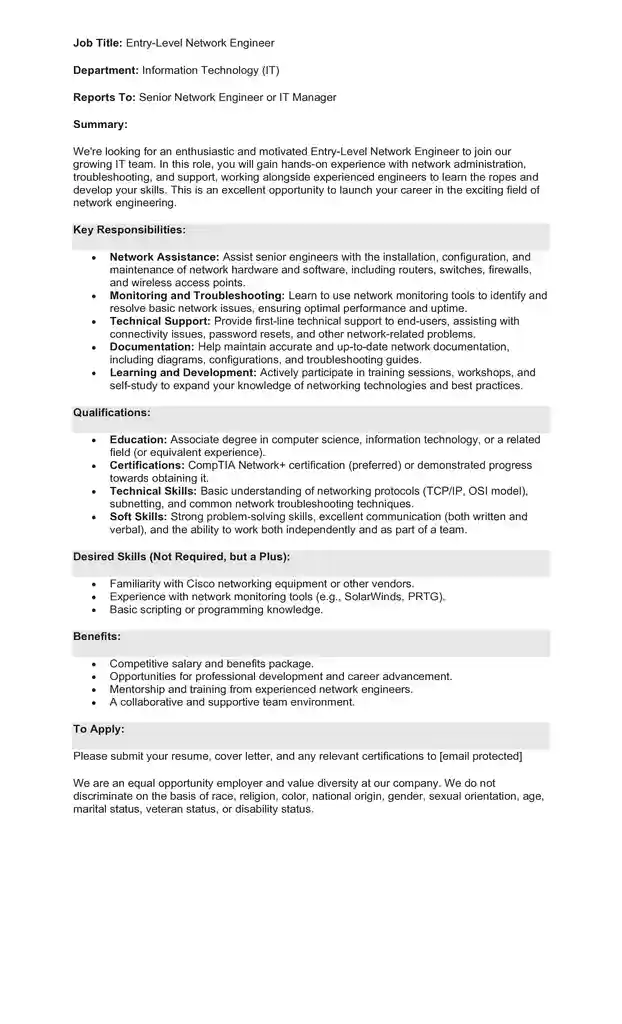
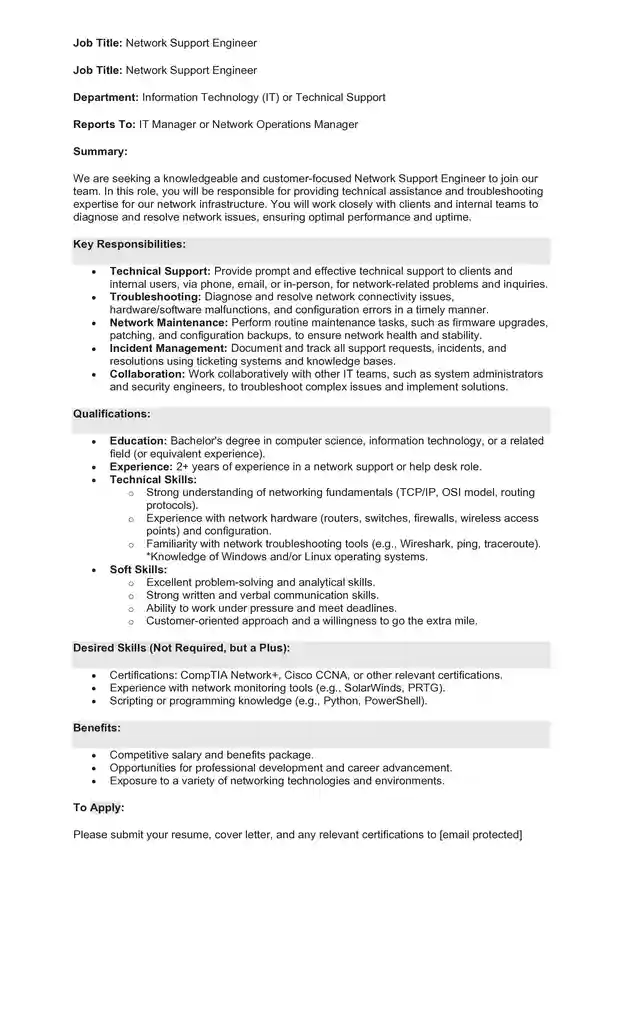
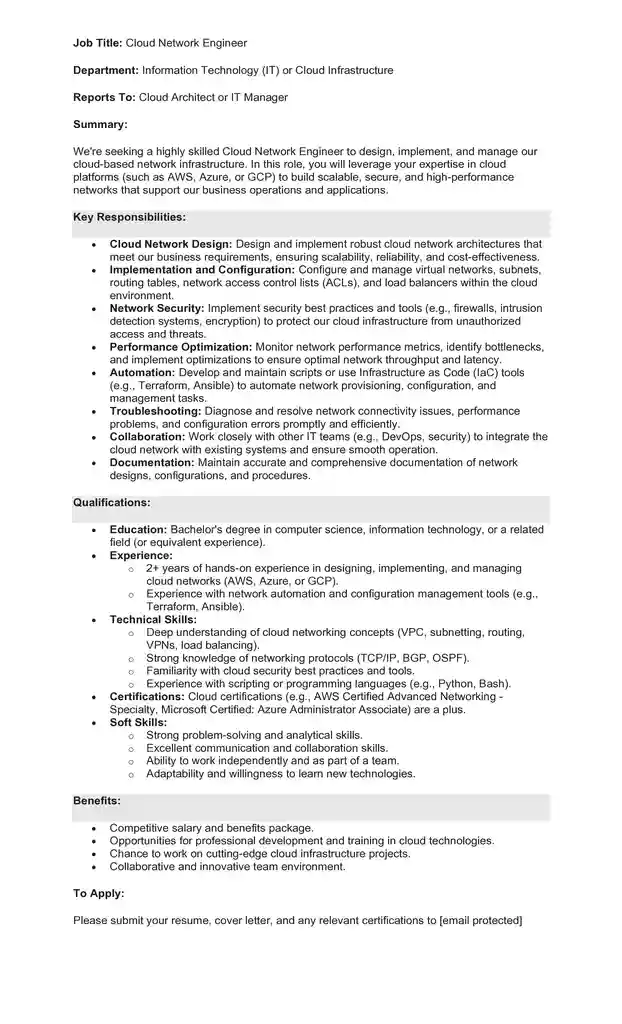
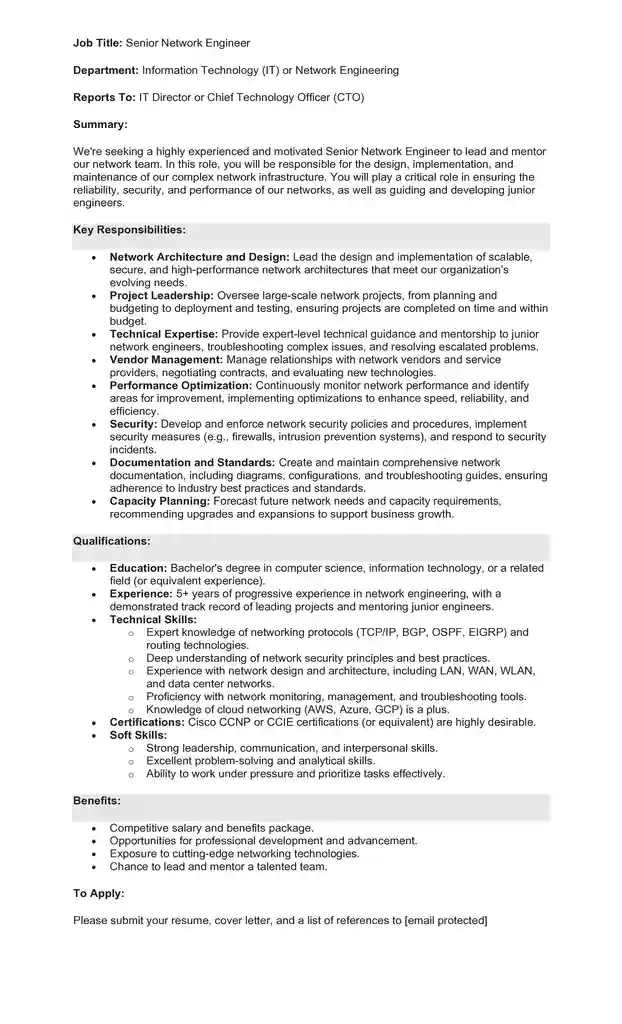
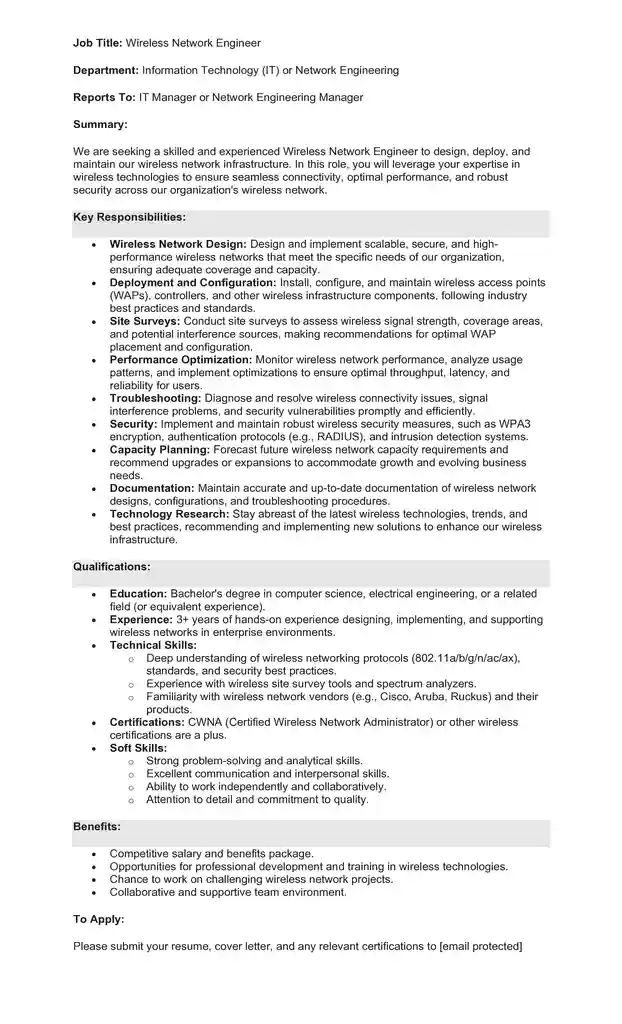
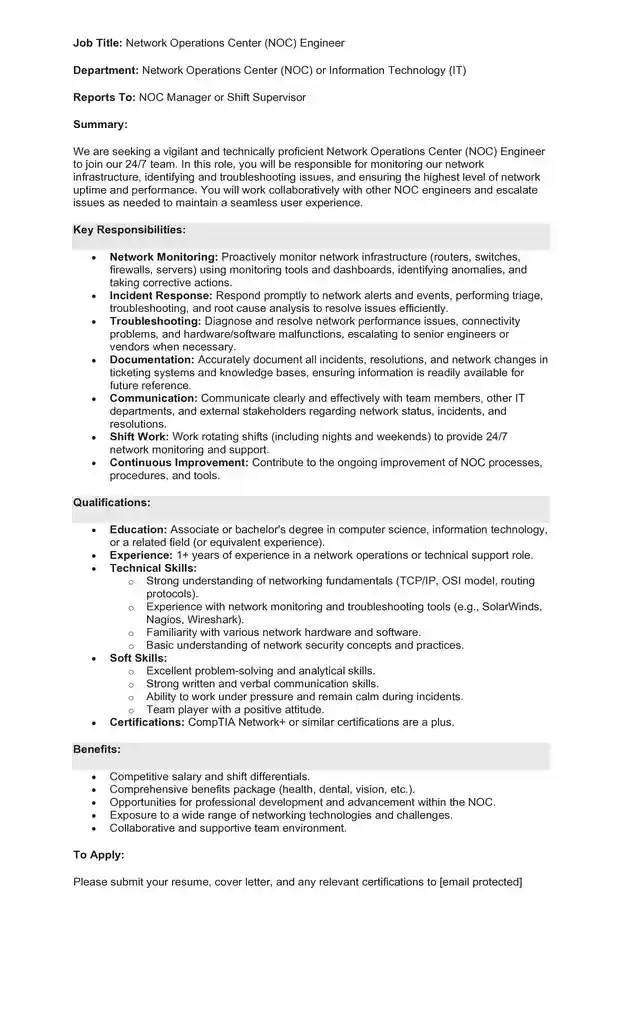
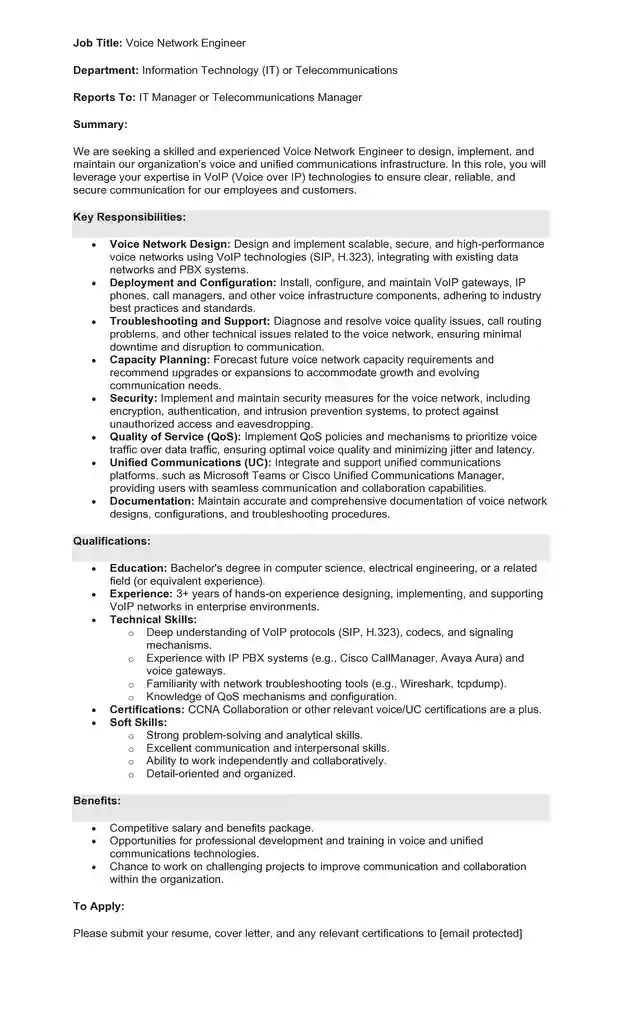
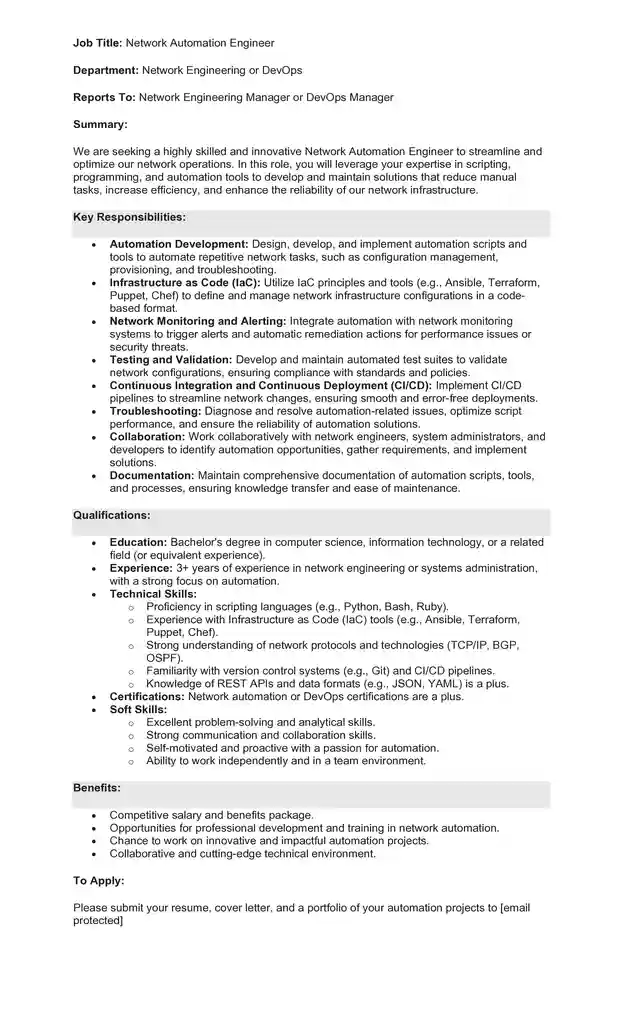
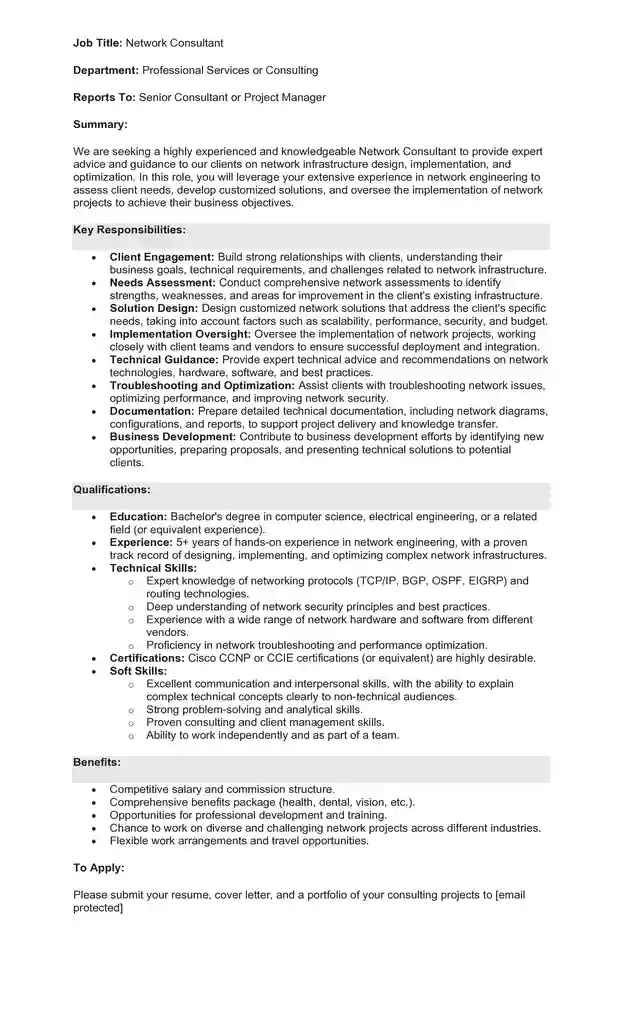
Conclusion
We’ve learned that the job description for a network engineer is essential for people in computers. They ensure that computer networks work well, safely, and without problems. Network engineers plan, build, and care for the systems that let data move around quickly in our digital world. The need for network engineers is growing because more people are using cloud computing, working from home, and needing strong security to protect their information.
Encouragement for Aspiring Network Engineers
If you like solving puzzles, want to know how things work, and love working with computers, you might really enjoy being a network engineer. This job doesn’t just pay well and offer nice benefits—it also lets you help people and businesses connect better. Yes, there are challenges, but solving them can be very rewarding.
Resources for Further Information
If you’re thinking about becoming a network engineer, here are some good places to start learning more:
- Educational Websites: Check out courses on websites like Coursera or Khan Academy to learn about computer science and network engineering.
- Certification Programs: Consider getting certified with programs from Cisco or CompTIA to learn important skills that many companies look for.
- Professional Groups: Joining a group like the IEEE (Institute of Electrical and Electronics Engineers) can help you meet other people who do what you want to do and keep up with new technology.

Alexander is a skilled HR expert who writes clear and compelling job descriptions. He has spent over 15 years in the HR field, helping companies find and keep the best employees. With a degree in Human Resources Management from the University of Chicago, he has the knowledge to back up his experience.








